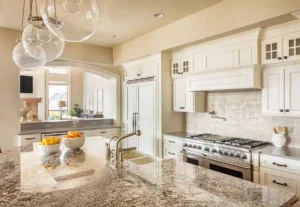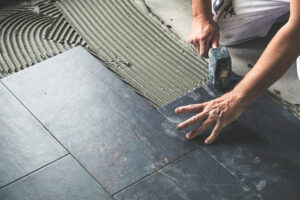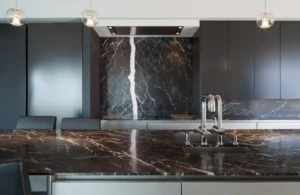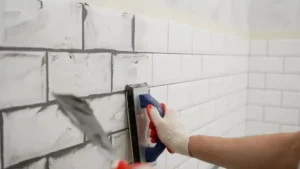Granite countertops are renowned for their durability and timeless beauty. However, like any other surface, they can suffer from damage over time. Whether it’s a chip, crack, or general wear and tear, knowing how to repair granite countertops is essential for maintaining their appearance and longevity. This comprehensive guide will walk you through various methods to repair your granite countertops, ensuring they look as good as new. We will also discuss the costs involved, the tools you may need, and when it’s best to call in professionals like SF Marble Granite.
Table of Contents
ToggleCan You Fix a Chip in Granite Countertops?
Chips in granite countertops are relatively common and can occur from everyday use, especially around high-traffic areas like the kitchen. The good news is that you can fix these chips yourself or with the help of professionals. Whether you’re dealing with granite or searching for solutions like quartz countertops near me, the method you choose depends on the size and location of the chip.
Small Chips
Epoxy or resin adhesives provide the ideal solution to repair small chips in granite surfaces when they become damaged, readily available at most hardware stores and easily mixed to match its color. Once applied, these epoxy solutions harden over time until becoming virtually undetectable against surrounding surfaces; here is a step-by-step guide.
Clean the Area
Before starting the repair, clean the chipped area thoroughly to remove any dirt or debris.
Mix the Epoxy
Follow the manufacturer’s instructions to mix the epoxy or resin.
Apply the Epoxy
Utilising a toothpick or similar tool, carefully apply epoxy to the chipped areas.
Smooth the Surface
Use a razor blade to level the epoxy with the rest of the countertop.
Let it Dry
Allow the epoxy to dry completely, usually for 24 hours.
Polish the Surface
Once dry, polish the area to restore the shine.
Larger Chips
If your granite countertops have larger chips, it may be best to consult a professional like those at SF Marble Granite for repair services. They possess the specialized tools and materials required for seamless repairs that match seamlessly into their design aesthetic.
Repairing Granite Countertops
Granite countertops can also develop scratches and stains over time. While these may not be as severe as chips or cracks, they can still affect the countertop’s appearance and functionality. Here’s how to repair granite countertops and address these common issues:
Removing Scratches
Scratches on granite countertops can be removed using polishing powder or a diamond polishing pad. Here’s how:
Clean the Area
Start by cleaning the scratched area thoroughly.
Apply Polishing Powder
Sprinkle a small amount of polishing powder onto the scratch.
Buff the Surface
Using a soft cloth or buffer, gently buff the area in a circular motion.
Wipe and Inspect
Wipe away the polishing powder and inspect the scratch. Repeat the process if necessary.
Seal the Surface
Once the scratch is removed, apply a granite sealer to protect the surface.
Removing Stains
Stains can be difficult to remove once they have been left to set for an extended period, especially if left in place for too long. To be effective at doing so, it is necessary to identify what type of stain it is before selecting an effective cleaning method:
Organic Stains
Use a poultice made from baking soda and water to draw out organic stains like coffee or wine.
Oil-Based Stains
Apply a mixture of baking soda and water to absorb oil-based stains.
Rust Stains
Rust stains can be tricky and may require a commercial rust remover. Always test a small area first.
Water Stains
For water stains, use a gentle cleaner and a soft cloth to wipe the area.
Always remember to seal the granite after removing stains to prevent future damage.
Repairing Cracked Granite Countertops
Cracks in granite countertops can be alarming, but they are not necessarily the end of the world. There are effective methods for granite countertop repair, depending on the severity and location of the crack. Here’s how to repair granite countertops and approach this:
Hairline Cracks
Hairline cracks in countertops tend to be cosmetic and should not compromise their integrity. Repair can often be accomplished using epoxy or resin applications; here is how the process works:
Clean the Crack
Start by cleaning the crack thoroughly with a mild cleaner.
Fill the Crack
Using a syringe or a fine applicator, inject the epoxy into the crack.
Level the Surface
Smooth the epoxy with a razor blade or a flat tool.
Let it Cure
Allow the epoxy to cure as per the manufacturer’s instructions.
Polish the Area
Once cured, polish the area to blend the repair with the rest of the countertop.
Deep Cracks
Cracked countertops can be particularly troubling, compromising their structural integrity. In such an instance, it is wise to seek professional assistance, such as that offered by SF Marble Granite, which will assess and recommend an appropriate course of action, such as using special adhesives and tools for crack repairs while reinforcing the countertop surface simultaneously.
Fixing Chips in a Granite Countertop
Chips, whether small or large, can mar the beauty of your granite countertop. Here’s a detailed guide on how to fix chipped granite counter edges and other areas:
Tools and Materials Needed
-
- Clear epoxy or resin
-
- Coloring agents (if needed)
-
- Razor blade
-
- Polishing powder
-
- Cloth
Step-by-Step Guide
Identify the Chip
Determine the size and depth of the chip.
Clean the Area
Clean the chipped area with a mild cleaner.
Mix the Epoxy
If the chip is deep or discolored, combine epoxy with an appropriate coloring agent for maximum effectiveness.
Apply the Epoxy
Carefully fill the chip with the epoxy using a toothpick or a fine applicator.
Level the Surface
Use a razor blade to smooth the epoxy.
Let it Cure
Allow the epoxy to cure completely.
Polish the Surface
Polish the repaired area to restore the shine.
Cracks and Chips: When to Call a Professional
While many minor damages can be repaired with DIY methods, some situations require professional intervention. If you encounter any of the following, it’s best to contact a specialist like SF Marble Granite:
Large Cracks or Chips
Significant damage can compromise the countertop’s integrity.
Structural Concerns
If the countertop seems unstable or wobbly, professional help is essential.
Color Matching Issues
Professionals have the tools and materials to perfectly match the color and texture of your granite.
Complex Repairs
Some repairs, like reinforcing the countertop, require specialized skills and equipment.
Preventing Future Damage
Prevention is always better than a cure. Here are some tips on how to repair granite countertops and prevent future damage to your granite countertops:
Use Cutting Boards
Always use a cutting board to avoid scratches and chips.
Clean Spills Immediately
Clean up spills, especially acidic substances, as soon as they occur.
Avoid Harsh Cleaners
Use mild, pH-neutral cleaners to avoid damaging the granite.
Seal Regularly
Regularly sealing your granite countertops can prevent stains and prolong their life.
Use Mats and Trivets
Place mats or trivets under hot pots and pans to prevent thermal shock and cracks.
Conclusion
Granite countertops are a beautiful and durable addition to any home, but they are not immune to damage. Knowing how to repair granite countertops can save you time and money and keep your countertops looking pristine. Whether you’re dealing with chips, cracks, or stains, this guide provides you with the tools and knowledge to tackle these issues. Remember, for complex repairs or when in doubt, it’s always best to consult a professional like SF Marble Granite. They can ensure your countertops are restored to their original beauty and strength.
For expert repair services, contact us at 978-459-5823 or visit us at 755 Dutton St., Lowell, MA 01854. We’re here to help you maintain the beauty and functionality of your granite countertops for years to come.
FAQs
Q1:What is the best way to repair chips in granite countertops?
A: The best way to repair chips in granite countertops is by using a clear epoxy or resin filler. For a seamless look, contact SF Marble and Granite for expert repair.
Q2: Can I repair a cracked granite countertop myself?
A: Small cracks can be filled with epoxy, but deeper damage may need professional help. SF Marble and Granite offers expert granite repair in Lowell and nearby areas.
Q3: How much does it cost to repair granite countertops?
A: Costs vary based on the damage, but minor repairs start at $100–$300. For an accurate estimate, contact SF Marble and Granite for a free consultation.








